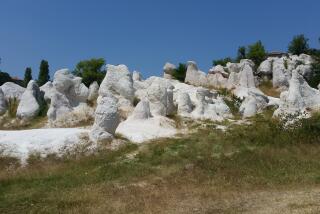Considering chaos
On a recent Tuesday afternoon, Le Meridien Hotel in Beverly Hills looks like a setting from a Robert Stone novel, a study in contrasts, in silence and movement, in darkness and light. In the back of the lobby, the hotel bar sprawls like some abandoned post-colonial outpost, empty except for CNN beaming the latest images from Iraq.
A few feet away, a Japanese model poses before a fountain. As a photographer circles deliberately, like a predator, assistants jostle for position at his side. All the while, at a small table near the front of the lobby, Stone, at 65, sits unperturbed, oblivious even, looking off into some interior distance as he talks about his new novel, “Bay of Souls,” in a languid demi-whisper, as if he were occupying an existential territory of his own.
Stone, of course, has always kept himself at a bit of a distance, despite his proximity to some of the major countercultural moments of the last 50 years. In the late 1950s, he drifted through the fringes of New York Beat society (his wife, Janice, worked at the Seven Arts, a Times Square coffee shop where Jack Kerouac, Herbert Huncke and Allen Ginsberg liked to hang out). A few years later, as a Wallace Stegner fellow at Stanford University, he was one of the early LSD pilgrims who congregated at Ken Kesey’s house on Perry Lane, a group that later evolved into the Merry Pranksters.
Yet for all his involvement, his sense of being an engage writer -- he did a stint as a journalist in Vietnam, and has spent time in the Gaza Strip and Central America -- Stone has never been a joiner, but rather a quintessential man apart.
“The difference between a lot of those guys and me,” he says of both Beats and Pranksters, “was that many of them came from solid Western farms, where the questions were all pretty well answered, and they were answered with no talking back. So they were ready to rebel. My situation was very different.
“My father left when I was small. I was in ... I guess I’d have to call it an orphanage, run by the Marist brothers, from the time I was 5 1/2 until I was 8. And I was really trying to get out of there. I was trying to get my mother to perform. You know, ‘Come on Mom, let’s wear two shoes that match today and let’s get me out of here.’ But sometimes she wouldn’t wear two shoes that matched, so I had a lot to lose. I mean, nobody was going to put me back in the orphanage, but I was scared. I was scared of chaos.”
If any single idea has defined Stone’s nearly 40-year career as a writer, it is this notion of chaos and how we behave in its presence, the way it can consume us at the core. Ever since his 1967 debut, “A Hall of Mirrors,” nearly all his characters have had to face that issue, whether they find disorder in the world around them or in the beating of their own corrupted hearts. It is his tendency to explore a larger, more morally ambiguous landscape that sets Stone apart from most of his contemporaries, eschewing both Beat fascination with self-mythology and Pranksters’ absurdist tendencies.
“Bay of Souls,” the story of Michael Ahearn, a professor of English at a small Midwestern college, is the first of Stone’s novels to begin with what might be called interior chaos in an exterior world that is deceptively smooth. “I wanted to deal with a character,” Stone explains, “who could take turmoil. One of the mass of men who live lives of quiet desperation.”
This is a perfect description of Ahearn. A man locked in a tense, distrusting marriage, the father of a 12-year-old son to whom he cannot, in any real sense, relate. He drinks too much, has acquaintances rather than friends, and is constrained in almost every aspect of his life. Then he meets Lara Purcell, an exotic beauty who has newly joined the faculty of his school. For Ahearn, she represents everything he’s missing -- a wilder, more elemental existence -- and in her thrall, he walks away from his wife, his son, his very reason, following her to the Caribbean island of St. Trinity, where he participates in a voodoo ritual meant to reunite Lara with her soul.
In the process, however, Ahearn loses a piece of himself, and free falls into psychic crisis. “I have my problems,” he tells a female student at the end of the novel, and when she presses him to elaborate, he answers simply, “That I have no soul.”
The question of soul -- of gaining it and losing it, of how we nourish it or how we don’t -- is another central element of Stone’s fiction, the idea that, even in the most hallucinatory moments, a spiritual quest is going on. Over the years, his characters (many of whom are drug cases or alcoholics, lost souls in the most fundamental sense) have been labeled burnouts, but really, just the opposite is true. For men like John Converse or Ahearn, it’s not that disassociation leads to chaos, but the other way around.
In Stone’s universe, then, everything -- alcohol, narcotics, lust, religion -- is a tool, a way of navigating the darkness, of making meaning where there is none. What’s striking, Stone insists, is that the deeper we delve into disorder, the more orderly it seems.
“There was this scene in one of the towns in the Gaza Strip,” he says, recalling a 1992 trip to the occupied territories. “The Palestinians are on strike because the U.N. can’t give them enough work. They’re having a sit-in, but the Israelis only allow us to employ so many people, so what are we going to do? And the girl who is the go-between for the Israelis and the strikers thinks everything is cool. But as it turns out, everything isn’t cool, and in the afternoon, there’s a bomb, and everything has gone as badly as it can.”
What Stone is suggesting is that, in almost any situation, reality is a matter of perception, that meaning, truth is relative and God is an emptiness with which we must continually contend. This, too, is a theme that marks his fiction including “Bay of Souls” where Ahearn sorrows after (but cannot reconcile with) his lapsed Catholicism.
Still, Stone insists, God is not an absence, not exactly. “I feel something like the aftermath of a divine presence,” he says, “although I don’t believe intellectually in the divine presence. I feel an order, a desired goodness that was presented to us, and that we somehow ignored.”
It is not, in other words, that God never existed, but that at some point he abandoned us, that he created the universe and moved on, leaving us to sift through the shard ends, “les mysteres,” as Stone calls them in “Bay of Souls,” “very old things ... left over from Creation,” all the things we cannot know.
In the face of that, Stone’s characters must continually ask themselves how to keep on living, how to face another day. “I think of Dostoevsky, who said, ‘Suicide has gotten me through many a difficult night,’ ” Stone says. “But on the other hand, I think you take courage and do what has to be done. Certainly, I have enough courage to see the sun go down tomorrow.”
As for what this means in an indifferent universe, Stone admits he doesn’t know. “It feels to me,” Stone murmurs, “very much that we are in a godless and, finally, uncontrolled situation, although I agree with Pascal who said, ‘One sees the evidence every day.’ It is impossible for me to believe, and yet I desire to believe.”
More to Read
Sign up for our Book Club newsletter
Get the latest news, events and more from the Los Angeles Times Book Club, and help us get L.A. reading and talking.
You may occasionally receive promotional content from the Los Angeles Times.









